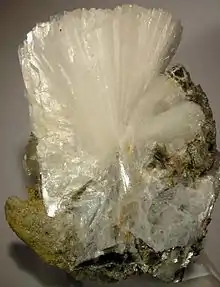| Bertrandite | |
|---|---|
 Bertrandite from the Golconda pegmatite, Minas Gerais, Brazil | |
| General | |
| Category | Sorosilicate |
| Formula (repeating unit) | Be4Si2O7(OH)2 |
| IMA symbol | Btd[1] |
| Strunz classification | 9.BD.05 |
| Crystal system | Orthorhombic |
| Crystal class | Pyramidal (mm2) H-M symbol: (mm2) |
| Space group | Ccm21 |
| Unit cell | a = 8.7135(4) Å, b = 15.268(1) Å, c = 4.5683(3) Å; Z = 4 |
| Identification | |
| Color | Colorless to pale yellow |
| Crystal habit | Thin tabular, prismatic to needle-like crystals commonly in radial clusters |
| Twinning | Common on {011} or {021} forming heart or V shaped twins |
| Cleavage | Perfect on {001}; distinct on {100}, {010} and {110} |
| Mohs scale hardness | 6 - 7 |
| Luster | Vitreous, pearly on cleavage surfaces |
| Diaphaneity | Transparent |
| Specific gravity | 2.59 - 2.60 |
| Optical properties | Biaxial (-) |
| Refractive index | nα = 1.591 nβ = 1.605 nγ = 1.614 |
| Birefringence | δ = 0.023 |
| 2V angle | Measured: 73° to 81° |
| References | [2][3][4] |
Bertrandite is a beryllium sorosilicate hydroxide mineral with composition: Be4Si2O7(OH)2. Bertrandite is a colorless to pale yellow orthorhombic mineral with a hardness of 6-7.
It is commonly found in beryllium rich pegmatites and is in part an alteration of beryl. Bertrandite often occurs as a pseudomorphic replacement of beryl. Associated minerals include beryl, phenakite, herderite, tourmaline, muscovite, fluorite and quartz.[2]
It, with beryl, are ores of beryllium.
It was discovered near Nantes, France in 1883 and named after French mineralogist, Emile Bertrand (1844–1909).[2][3][4]
One of the world's largest deposits of bertrandite is Spor Mountain, Thomas Range, Utah which is currently the source of most of the world's beryllium production.[5][6]
See also
References
- ↑ Warr, L.N. (2021). "IMA–CNMNC approved mineral symbols". Mineralogical Magazine. 85 (3): 291–320. Bibcode:2021MinM...85..291W. doi:10.1180/mgm.2021.43. S2CID 235729616.
- 1 2 3 Handbook of Mineralogy
- 1 2 Bertrandite on Mindat.org
- 1 2 Bertrandite on Webmineral
- ↑ Fact Sheet 2016–3081 (October 2016). "Beryllium—A Critical Mineral Commodity—Resources, Production, and Supply Chain" (Article). usgs.gov/. pubs.usgs.gov: USGS. p. 4. Retrieved 16 May 2017.
{{cite web}}: CS1 maint: numeric names: authors list (link) - ↑ Shawe, Daniel (1968). Ridge, John (ed.). Geology of the Spor mountain Beryllium District, Utah, in Ore deposits of the United States, 1933-1967. New York: The American Institute of Mining, Metallurgical, and Petroleum engineers, Inc. pp. 1148–1161.